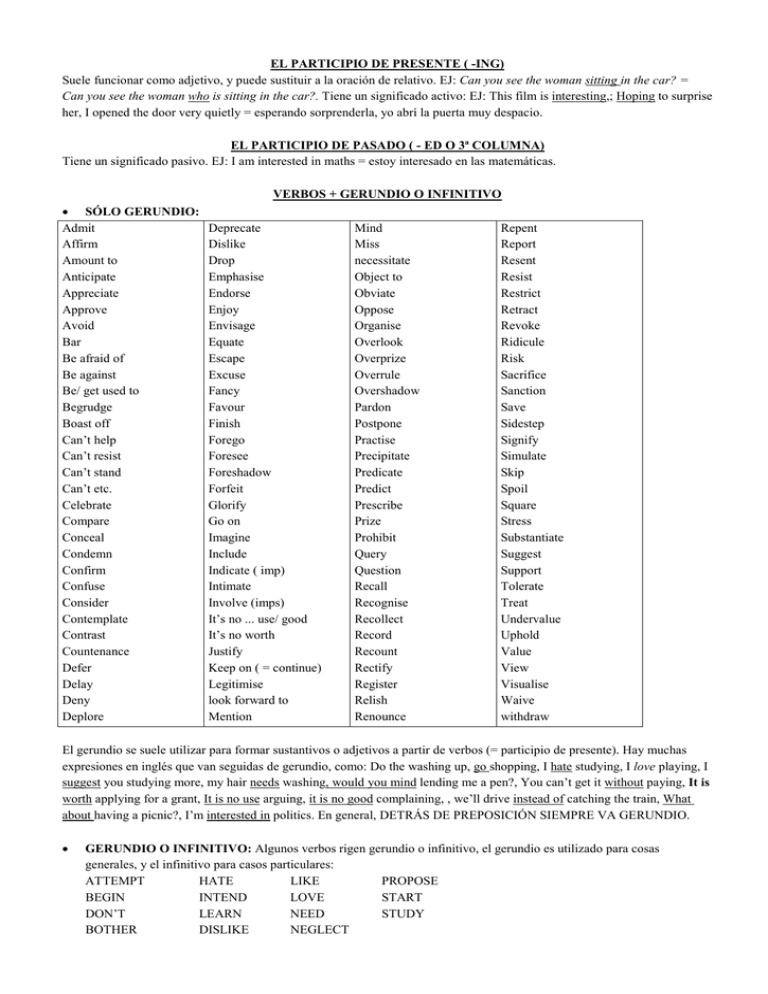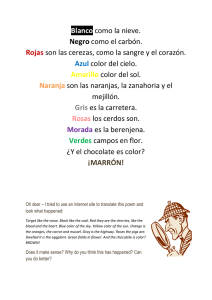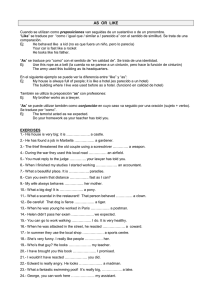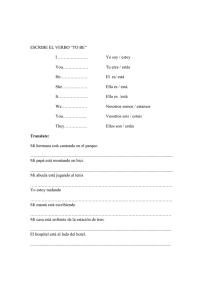el participio de presente ( -ing)
Anuncio

EL PARTICIPIO DE PRESENTE ( -ING) Suele funcionar como adjetivo, y puede sustituir a la oración de relativo. EJ: Can you see the woman sitting in the car? = Can you see the woman who is sitting in the car?. Tiene un significado activo: EJ: This film is interesting,; Hoping to surprise her, I opened the door very quietly = esperando sorprenderla, yo abrí la puerta muy despacio. EL PARTICIPIO DE PASADO ( - ED O 3ª COLUMNA) Tiene un significado pasivo. EJ: I am interested in maths = estoy interesado en las matemáticas. VERBOS + GERUNDIO O INFINITIVO • SÓLO GERUNDIO: Admit Affirm Amount to Anticipate Appreciate Approve Avoid Bar Be afraid of Be against Be/ get used to Begrudge Boast off Can’t help Can’t resist Can’t stand Can’t etc. Celebrate Compare Conceal Condemn Confirm Confuse Consider Contemplate Contrast Countenance Defer Delay Deny Deplore Deprecate Dislike Drop Emphasise Endorse Enjoy Envisage Equate Escape Excuse Fancy Favour Finish Forego Foresee Foreshadow Forfeit Glorify Go on Imagine Include Indicate ( imp) Intimate Involve (imps) It’s no ... use/ good It’s no worth Justify Keep on ( = continue) Legitimise look forward to Mention Mind Miss necessitate Object to Obviate Oppose Organise Overlook Overprize Overrule Overshadow Pardon Postpone Practise Precipitate Predicate Predict Prescribe Prize Prohibit Query Question Recall Recognise Recollect Record Recount Rectify Register Relish Renounce Repent Report Resent Resist Restrict Retract Revoke Ridicule Risk Sacrifice Sanction Save Sidestep Signify Simulate Skip Spoil Square Stress Substantiate Suggest Support Tolerate Treat Undervalue Uphold Value View Visualise Waive withdraw El gerundio se suele utilizar para formar sustantivos o adjetivos a partir de verbos (= participio de presente). Hay muchas expresiones en inglés que van seguidas de gerundio, como: Do the washing up, go shopping, I hate studying, I love playing, I suggest you studying more, my hair needs washing, would you mind lending me a pen?, You can’t get it without paying, It is worth applying for a grant, It is no use arguing, it is no good complaining, , we’ll drive instead of catching the train, What about having a picnic?, I’m interested in politics. En general, DETRÁS DE PREPOSICIÓN SIEMPRE VA GERUNDIO. • GERUNDIO O INFINITIVO: Algunos verbos rigen gerundio o infinitivo, el gerundio es utilizado para cosas generales, y el infinitivo para casos particulares: ATTEMPT HATE LIKE PROPOSE BEGIN INTEND LOVE START DON’T LEARN NEED STUDY BOTHER DISLIKE NEGLECT • - CEASE DETEST OMIT DREAD ENDURE PREFER O dependiendo de su significado, como: LIKE/LOVE + TO INFINITIVE = Cuando consideramos la acción correcta o apropiada y se refiere a una acción potencial ( EJ: I like people to be polite), como algo usual. “ Prefer”. =general thing LIKE/ LOVE + GERUND: Significado de presente o actualización. Similar a enjoy. =a particular situation HATE + TO INFI.: I hate to interrupt you while you are working.= en general. HATE + GERUND: I hate interrupting you = ahora. Dado que no existe una regla específica en los verbos que expresan gustos, la tendencia en el inglés británico es utilizarlos con gerundio, sin embargo, en el inglés americano, el infinitivo es más común. The verbs like and hate express liking if they are followed by a gerund: I like getting up early in summer. (I enjoy getting up early in summer.) I hate dancing, so don't ask me to. (I don't like dancing.) But if these verbs are followed by a to-infinitive, they express habitual preference, something that we do not necessarily like or enjoy but consider as useful, right or wise: I like to be punctual. (It's important to be punctual and I am.) I hate to lie, but sometimes I do. (It's not right to lie but sometimes I do.) If like is in the negative, a gerund refers to an action that we do but don't enjoy doing, while a to-infinitive means that we don't do something because we don't think it right to do: I could tell that Sandra didn't like being photographed though she didn't say a word. (Sandra was photographed, which she didn't like.) Sandra didn't like to be photographed, so she turned her back to the camera. (Sandra didn't want to be photographed, and she wasn't.) Prefer and can't bear can also take a gerund or a to-infinitive: I prefer walking to taking the bus. (I like walking better than taking the bus.) If you prefer to walk, it will take you 30 minutes to school. (If you want to walk, it will take you 30 minutes to school.) I can't bear seeing people being humiliated. (I don't like it when I see people being humiliated.) I couldn't bear to see those animals suffer, so I looked away. (I didn't want to see them suffer, so I looked away.) - REGRET/ REMEMBER/ RECALL/ FORGET + TO INF. : La acción que expresa el verbo principal es porterior al proceso mental de recordar, olvidar, etc. EJ: I remembered to post the letter. REGRET/ REMEMBER/ RECALL/FORGET + GERUND: La acción es anterior al proceso mental. EJ: I remember meeting her once in London. REGRET + TO INF.: siempre seguido de un verbo de comunicación. STOP + TO INF.: La acción aún no ha comenzado. I stop to study = Paré para estudiar. STOP + GERUND: La acción ha terminado. I stopped studying.= paré de estudiar. MEAN + TO INF.: “ intend”, querer decir, tener por fín. MEAN + GERUND: “ involve” TRY + TO INF. : intentar TRY + GERUND: experimentar. PROPOSE + TO INF: intend PROPOSE + GERUND : “ suggest” AFRAID - TO BE NOUN = I’m afraid of monsters OF FRIGHTENED GERUND = I’m frightened of seeing monsters. WORRIED - TO BE NOUN= I’m worried about Peter ABOUT NERVOUS GERUND = I’m nervous about going to the dentist’s. • INFINITIVO SIN TO: Va con verbos como:Let, make ( = permitir a alguien que haga algo), can, may, must, had better, would rather... ( MODALES) y con verbos de percepción ( see, hear, feel, notice, watch) con el significado de acción completada, si se refieren a un proceso van con gerundio. • INFINITIVO CON TO: Como complementos, tienden a describir una situación que es posible, eventual o futura en relación con el proceso representado por el verbo principal. Con: Afford dare hope profess Agree decide is ( obligation) promise Appear desire learn prove Arrange determine long refuse Ask demand manage resolve Attempt deserve mean ( intend) seem Be bound endeavour offer swear Care expect ought trouble Choose fail prepare undertake Claim guarantee pretend volunteer Come (for a purpose) help proceed want need vow wish - Verbos que representan procesos mentales: ASSUME, BELIEVE, CONSIDER, UNDERSTAND, FEEL, IMAGINE, KNOW (CON OPCIONAL TO) Después de adjetivos como: ANGRY, ANXIOUS, CERTAIN, CHEAP, DIFFICULT, DIAPPOINTED, EASY, EXCITED, EXPENSIVE,GLAD, GOOD, HAPPY, HARD, IMPORTANT, INTERESTING, (UN)LIKELY, PLEASED, IMPOSSIBLE, POSSIBLE, PROUD, SAD, SORRY, SURE, SURPRISED. -




